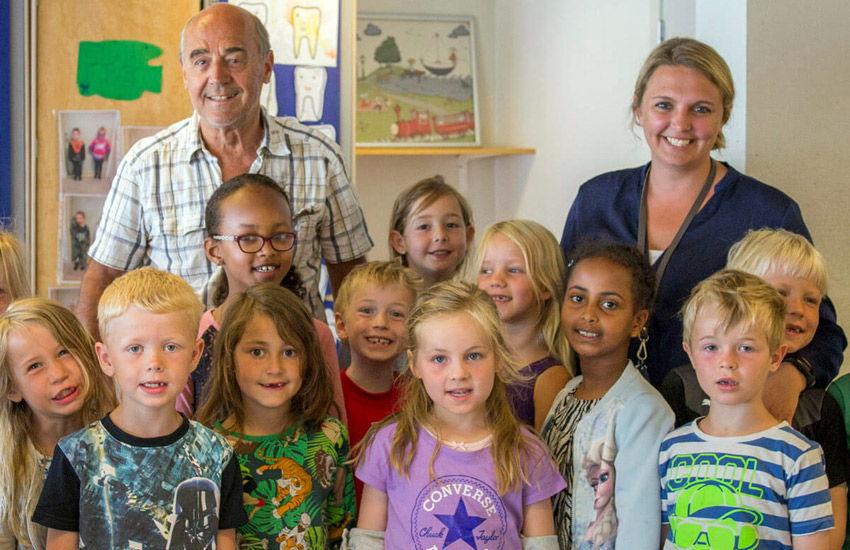The Program Where Older Volunteers Become School ‘Aunts’ and ‘Uncles’
This novel effort in Denmark could be replicated in the United States

One morning a week, we are 12 older adults assisting in one of the youngest classes at our local school in Denmark. We call ourselves School Aunts and School Uncles.
With 25 curious and lively children per class, a lone teacher cannot give each pupil the attention that every boy or girl really needs to grow and develop. That is why we are there. It is our goal that every child is heard and seen by a mature adult, who is there for their sake. And along the way, we hope to help the children with social or technical challenges — all in close cooperation with the teacher, of course. It’s a program, I think, that could be replicated in the United States.
Sometimes, as the somewhat similar AARP Experience Corps tutoring program shows, a little attention and presence with a single child who may need extra help can contribute to his or her development.
We are there primarily for the sake of the children. But we get so much joy and attention back.
Teachers are happy that we are there and that we can, for example, read with a child or with a group of pupils who need it. The parents often tell us how happy they are for the extra hand. And in a short period of time we associate good friendships with the children.
We are there — all of us school aunts and uncles — primarily for the sake of the children. But we get so much joy and attention back from the life-giving relationship with them.
We are all grandparents with our own children and grandchildren, but as one of our School Uncles said, “I’m so glad to be with the kids in my class that I doubt if I can say goodbye to them when they grow older. Maybe I have to join them as School Uncle, even when they go to high school.”

How the School Aunts and Uncles Program Started
The School Aunts and Uncles program started after I left my job in an international office in Aarhus, Denmark in 2010 to start a new project with four employees focusing on older adults and the labor market. Occasionally, I heard about a school project in Sweden where older men who were unemployed could work at schools for a period of time as what they called “class-grandfathers.” I immediately wrote to the primary school in my community on the outskirts of Aarhus, asking if we could establish a program letting retirees volunteer as assistants in the youngest classes.
It took two years of mails and meetings with the school leadership to get a green light.
The next challenge was to find retirees who might be interested in helping at school one morning a week. At last, after I designed and distributed hundreds of flyers, two women (ages 72 and 81) I didn’t know and one of my friends agreed to volunteer for the pilot project in autumn 2012.
Where the Program Stands Now
Over the next couple of years, the group of volunteers grew slowly. But since 2014, when I started as a School Uncle myself, 10 to 12 of us have been School Aunts and Uncles — many now on their fourth or fifth year.
What’s more, the school’s management is now paying close attention to us and the municipality has organized courses to strengthen the quality of our volunteer contributions.
Children and young people often need an adult friend, and that’s especially true for vulnerable youngsters. Who could be better as mentors and adult friends than men and women arriving after their last day of full-time work, with plenty of time and talent and with hopes to fill their lives with meaningful activities?
For many of us, the time has come to pay back a dividend of all the valuable experience and social capital we’ve accumulated during our lifetimes.


